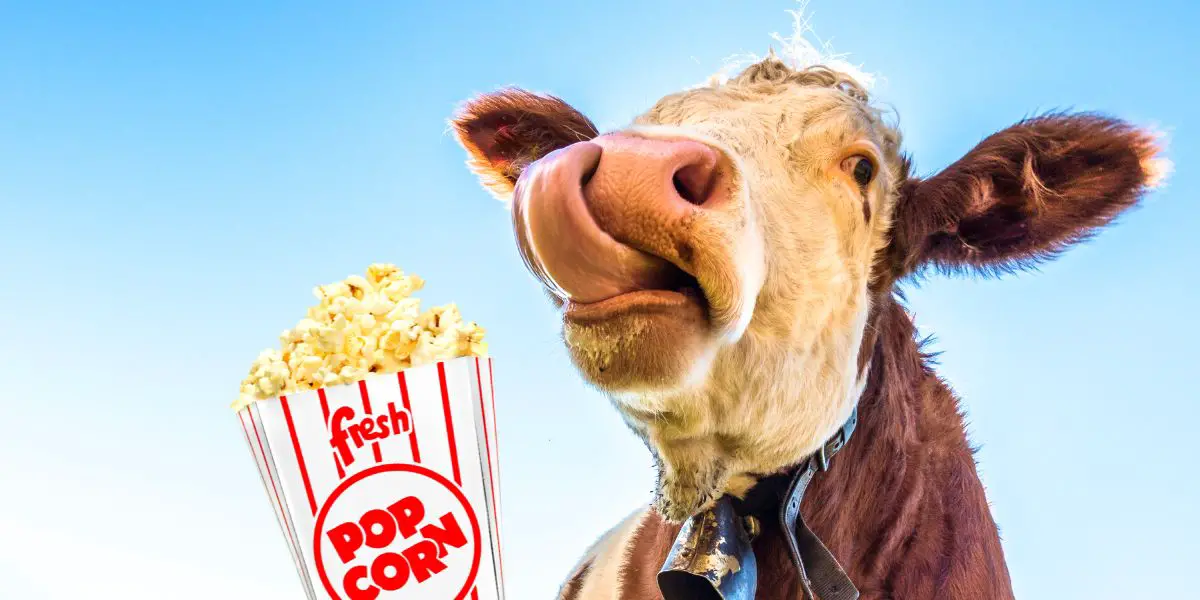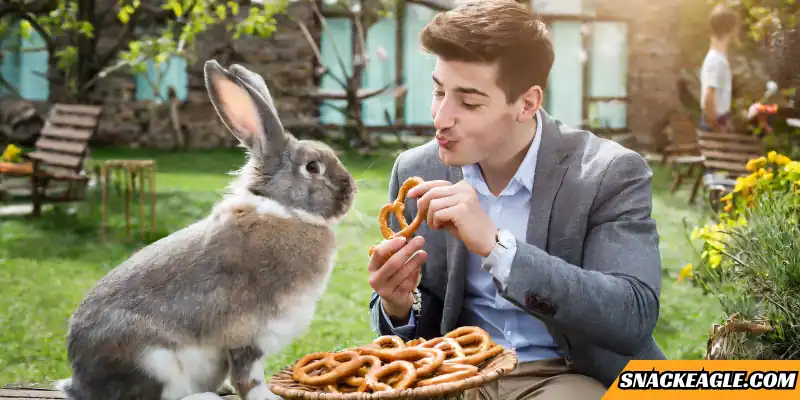Cows might be well-known for chomping on grass, but they can also eat popcorn.
Small amounts of popcorn can be fed to cows either as a snack or as a filler ingredient alongside their normal feed.
It’s important to note that popcorn isn’t the best treat option to give to cows, but a small amount fed the right way is unlikely to do them any harm.
Now we know that cows can eat popcorn, let’s find out the best way to feed it to them and whether there are any health benefits associated with cows eating this delicious treat.
Is Popcorn Safe for Cows?
Yes, popcorn is safe for cows, but it must be fed in moderation. Popcorn must also be ground down as much as possible before it is fed to cows to help them swallow and digest it.
Can Cows Eat Popcorn With Flavorings?
Yes, cows can eat popcorn with some flavorings. One of the most surprising ones is sugar. Cows are used to eating sugar as they are often fed candy by farmers because it provides low-cost nutrients to them. This means that there’s no need to be afraid to serve up some sweet popcorn to any cows in your care.
Salted popcorn is also an option for cows. It’s recommended that cows have their diet supplemented with salt to lower the chance of them getting grass tetany. Grass tetany is a deadly disease that is caused by a lack of magnesium and calcium and excess potassium.
There is around 2 mg of salt in salted popcorn, according to the USDA. Feeding small amounts of salted popcorn to cows could therefore help to protect them from this nasty disease.
Is Popcorn Healthy for Cows?
Popcorn can be healthy for cows if it’s eaten in moderation. One of the biggest benefits of letting cows eat popcorn is its high fiber content. Beef cattle need fiber to protect their rumen wall. There’s 3.6 g of fiber in 3 cups of popcorn, so it’s a good way to get a little extra fiber into a cow’s diet.
There are some other important nutrients found in popcorn that could benefit cows. These include:
- Zinc – cows need zinc to keep their reproductive systems healthy. Zinc often needs to be given as a supplement to cows as they’re not able to store enough of it. It’s possible that popcorn could help to boost zinc levels in cows.
- Iron – cows need 50 mg of iron for every kg of forage they eat. There’s 0.9 mg of iron in 28 g of popcorn which means a little popcorn can help cows get more iron in their diets.
- B vitamins – there are vitamins B1, B3, and B6 in popcorn. Lactating cows need B vitamins to improve their milk production, which is how popcorn may benefit these animals.
- Potassium – potassium is another nutrient that aids milk production in cows. You’ll find around 78 mg of potassium in 28 g of popcorn.
Can Cows Eat Corn?
We all know that popcorn is made from corn. Now we know that cows can eat popcorn, it’s only natural to assume that cows can eat corn.
But, there’s not a simple yes or no answer to this question.
Cows can eat corn, but if they eat a large amount of it, it’s not good for them.
Too much corn can cause the following health issues in cows:
- Bloating
- Excess gas
- Liver abscesses
- E.coli
For these reasons, both corn and popcorn consumption should be limited.
How to Feed Popcorn to Cows
As previously mentioned, ground popcorn is the best type of popcorn to feed to cows. You can ground popcorn in several ways, including:
- In a blender
- In a seed grinder
- In a food processor
- By hand
- In a coffee grinder
The good thing is you can even grind stale popcorn for cows, which helps to reduce food waste.
When the popcorn is ready, you can feed it to cows:
- On its own.
- With sweet treats, like candy, chocolate, and marshmallows.
- With some of their favorite fruit and veggies, such as pumpkins, oranges, and sugar beets.
For our full guide to which animals can eat popcorn check our article.
Is Popcorn Dangerous for Cows?
Popcorn needs to be fed to cows in moderation. One problem with popcorn is that it’s high in phosphorus (8 mg per 1 cup) but contains no calcium. This can increase the risk of cows developing urinary stones.
To prevent this from happening, you need to make sure that the cows get enough calcium in their diet. Ensuring that cows have access to lots of grass and plants is a good way to keep their calcium levels stable.
Popcorn can also be dangerous to cows if they eat it whole rather than ground up. They could find popcorn difficult to chew and may choke on it.
There’s also a risk that the popcorn gets stuck in their teeth – which we all know is a big nuisance! If this does happen, help the cow out by removing the popcorn from their teeth.
Cows are one of many animals that can eat popcorn. But before you go dishing out handfuls of this treat to any cows, you need to make sure you follow a few rules. These include carefully grinding the popcorn down and only feeding it occasionally.
Curious what other farm animals can eat popcorn? Check out our articles:
Sources
http://extension.msstate.edu/publications/publications/fiber-beef-cattle-diets
https://www.usda.gov/
https://www.dairyglobal.net/health-and-nutrition/nutrition/benefits-of-vitamin-b-for-dairy-cows/
https://dairy-cattle.extension.org/excess-sulfur-and-potassium-can-cause-mineral-nutrition-problems-with-dairy-cows/
https://www.alphafoodie.com/how-to-make-cornmeal




